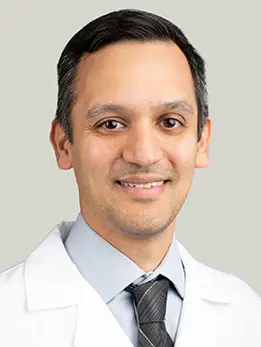Studies suggest ambient AI saves time, reduces burnout and fosters patient connection

When physicians don’t have to type detailed clinical notes while simultaneously talking to their patients, the visit feels different. Eye contact lasts longer, follow-up questions become sharper, and — crucially — clinicians go home less drained.
That’s the promise of ambient clinical documentation, an artificial intelligence (AI)-assisted technology that records healthcare conversations and transforms them into clear, accurate clinical note drafts that are reviewed and approved before being added to a patient’s electronic health record (EHR).
To assess whether this promise can become reality, researchers at the University of Chicago Medicine contributed to two new papers published in JAMA Network Open that analyze ambient AI scribes’ effect on clinicians’ well-being and interactions with the EHR. Together, they show lower burnout and lighter cognitive load for users, plus measurable cuts in documentation time.
“Health systems are at an inflection point of reimagining care delivery with new tools that are emerging, especially in generative AI,” said Sachin Shah, MD, Chief Medical Information Officer at UChicago Medicine and an author on both papers. “Rather than letting the change be something that happens to us, it’s important for clinicians to be deeply engaged to influence and direct how tools are deployed to benefit patients and healthcare professionals.”
Efficiency and well-being
The first study surveyed over 250 physicians and advanced practice providers across six health systems that ran ambient AI pilot programs. Self-reported clinician burnout dropped from roughly 52% to 39%, and participants also reported lower cognitive burden, less after-hours documentation, and a better ability to stay present with patients.
Neda Laiteerapong, MD, MS, Associate Director for the Center for Chronic Disease Research and Policy, said the findings mirror what she’s observed as one of over 800 UChicago Medicine clinicians using ambient AI in day-to-day practice.
“Physicians notice the impact of having their cognitive load lightened,” she said. “We’re more focused throughout the day and less mentally exhausted, leaving more energy and compassion to dedicate to improving patients’ quality of life, even through seemingly small changes like ordering lab tests further ahead of a clinical visit.”
Time savings add up
The second study dove deeper into data from UChicago Medicine’s ambient clinical documentation pilot, focusing on clinicians’ time spent interacting with EHRs. To control for technology adoption bias and other confounding factors, researchers matched ambient AI scribe users to a “look-alike” group of non-users based on baseline EHR habits, specialty, and clinic volume.
They found that clinicians using the ambient clinical documentation tool spent 8.5% less total time in the EHR than their matched controls, with more than a 15% drop in time spent composing notes specifically.
“At first glance, an 8.5% reduction in documentation time might seem small, but when you do the math, a clinician who sees 20 patients per day and saves two or three minutes per patient by using an ambient AI scribe could recoup multiple hours per week,” said Kevin Pearlman, MD, who helped lead this study as a clinical informatics fellow at UChicago Medicine.
“That’s time clinicians could spend diving deeper into a patient’s medical history, using support tools to inform better clinical decisions, or completing other patient care-related tasks.”
Why study a tool that seems obviously useful?
The benefits of ambient clinical documentation may appear self-evident, but experts stress that it needed validation — just like anything else introduced into clinical practice. Rigorous studies help separate the tool’s impact from other changes happening in the health system, show which specialties and clinician groups benefit most, and confirm that efficiency gains support better care and clinician well-being.
“Adding technological innovations like this to a healthcare systems costs money, so we want to make sure it truly adds value to the patients and people who work here,” said Laiteerapong, who was the senior author on the UChicago Medicine-specific study. “This kind of rigorous research is part of our due diligence as an academic medical center — making sure we’re investing time, energy and resources into worthwhile outcomes.”
Next steps: exploring the patient experience
As UChicago Medicine looks forward to expanding staff access to ambient clinical documentation tools, the team expressed interest in turning their analyses to the patients’ perspective.
Early internal survey data shows overall modest but steady improvements in patient-experience scores among clinicians who use ambient AI. However, those who used ambient AI the most saw significantly greater improvements in their patient experience measures. According to the researchers, next steps include pairing larger, long-term survey data with qualitative interviews of patients and clinicians to capture how conversations feel, whether visits seem more personal, and how reclaimed attention is used, so the patient voice sits alongside the numbers.
“UChicago clinicians are deeply committed to our patient population, and we want to see those patients thrive,” Shah said. “We hope these tools will continue to give us that ability to focus on that. It's technology, yes, but the goal is to make us more humanistic clinicians. If AI can reduce some of the clerical and administrative grunt work, we’ll be able to focus on being there for our patients.”
“Use of Ambient AI Scribes to Reduce Administrative Burden and Professional Burnout” was published in JAMA Network Open in October 2025. Co-authors are Kristine Olson, Daniella Meeker, Matt Troup, Timothy Barker, Vinh Nguyen, Jennifer Manders, Cheryl Stults, Veena Jones, Sachin Shah, Tina Shah and Lee Schwamm.
“Use of an AI Scribe and Electronic Health Record Efficiency” was published in JAMA Network Open in October 2025. Co-authors are Kevin Pearlman, Wen Wan, Sachin Shah and Neda Laiteerapong.

Sachin D. Shah, MD
Sachin D. Shah, MD, provides comprehensive primary care to adults and children of all ages. He serves as Chief Medical Information Officer of UChicago Medicine.
Learn more about Dr. Shah
Neda Laiteerapong, MD, MS
Neda Laiteerapong is a practicing general internist and researcher in the Department of Medicine at the University of Chicago. Dr. Laiteerapong’s work focuses on improving the understanding of how the quality of life in older adults with diabetes is affected by geriatric syndromes, hypoglycemia and macrovascular and microvascular complications of diabetes.
Learn more about Dr. Laiteerapong